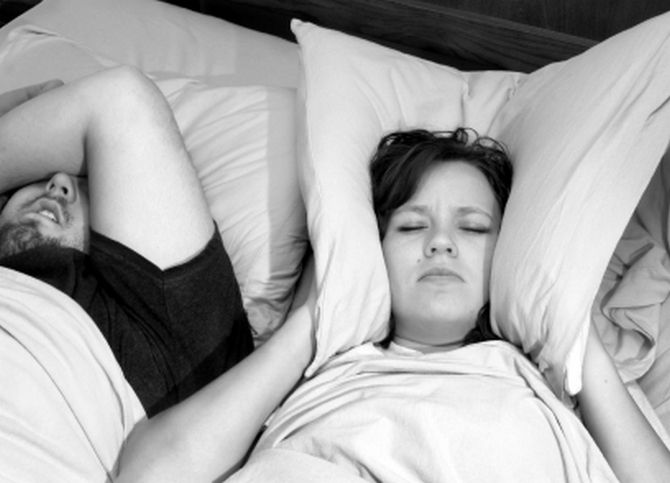Tweak your lifestyle a little to enjoy a snore-free sleep, say experts.

Sapna Hegde and her husband, Anuj (names changed), are both mid-level executives in their 40s.
Anuj didn't know it but he had started snoring heavily at night, which began to worry Sapna.
He would often wake up with a bad headache and be drowsy at work.
Sapna, too, was unable to get a good night's rest.
They even began sleeping in separate bedrooms, till they finally decided to go to a doctor, who diagnosed it as obstructive sleep apnoea.
Snoring is a fairly common problem these days, due to lifestyle changes and lack of exercise.
About 20 per cent of our walk-in patients at the clinic are affected by snoring.
It is usually the partner who notices the snoring and brings it to their attention.
Otherwise, the patient usually approaches us with related ailments that occur due to the lack of sleep and deprivation of oxygen to the brain like excessive day time sleep, headache and hypertension.
Snoring occurs due to the blocked breathing passage.
This leads to decreased oxygen supply to different organs, which could lead to cardiac problems, increase the risk of stroke, hypertension and uncontrolled diabetes and decrease libido.
Structurally, snoring could occur because of obstruction anywhere -- from the nose to the laryngopharynx.
In adults, it could be a deviated nasal septum, nasal polyps, enlarged tonsils, elongated uvula or a large tongue.
In children, adenoids is the most common reason for snoring.
Enlarged tonsils block the passage of air, especially during their sleep, so patients end up breathing through their mouth.
While children become hyperactive and irritable due to lack of sleep, adults become drowsy and are not able to focus on work.
Alcohol is another major factor which decreases the neck muscle tone that leads to a collapsed airway during sleep.
Lack of exercise can lead to obesity and greater deposit of fat around the neck, which again reduces the passage for air.
If left untreated, it can cause other complications.
Obstructive sleep apnoea and snoring may lead to heart attacks at night.
Treatment varies according to the underlying cause.
It could be through medicine or surgery.
The best way to treat this problem is by making lifestyle modification like exercising regularly and having a healthy diet.
In case of a nasal allergy, you can use nasal sprays.
If it's a structural abnormality, surgeries like adenoidectomy (surgical removal of the adenoids), tonsillectomy (a surgical procedure in which each tonsil is removed), uvulopalatopharyngoplasty (to tighten up flabby tissues and enlarge the upper air passages) and hyoid suspension (treatment of obstructive sleep apnea) might be advised.
Photograph: Renee Moller/Creative Commons










